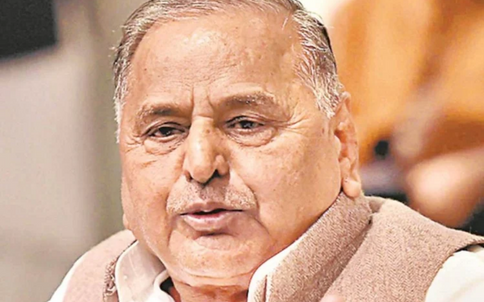Mulayam Singh Yadav, who died at 82 on Monday, was a product of anti-Congress, pro-Mandal and anti-Kamandal politics. A wrestler to start with, Mulaym had no cushion of family name or fame. He was an ordinary worker of Ram Manohar Lohia’s Samyukta Vidhayak Dal in his student days. He had the plus and minus points of growing in UP politics in tumultuous decades of 1960s to 1990s. Rugged, anti-English and anti-IT, Mulayam was pushed away by the tide of modernization that India had seen since 1991 economic reforms. After being chief minister for three terms, getting elected to Lok Sabha seven times and Assembly for ten times, Mulayam was considered briefly for the post of prime minister.
After the CPM Politbureau dashed off the proposal to make Jyoti Basu the prime minister in 1996, then the choice was between VP Singh, Lalu Prasada Yadav and Mulayam Singh Yadav. VP Singh disappeared from the scene on his own volition and Lalu had to contend with the fodder scam. Mulayam preferred to remain active in UP politics. It was only then that Deva Gowda, who was in his second year as chief minister of Karnataka, was forced to become prime minister against his will. It was Hari Kishan Singh Surjeet, CPM strongman, who was calling the shots although the TDP chief minister, first NTR and then Chandrababu Naidu, was the convener of the National Front.
Mulayam was adept at winning the game somehow without sticking to any principles or lofty ideals. Means never mattered to him. He had alliance with all the parties – the BJP, BSP and the Congress. First it was with the BSP of Mayawati in order to stop the BJP from coming to power again. The elections were held in 1993 after PV Narasimha Rao dismissed BJP government of the UP in the aftermath of the demolition of Babri Masjid. Mulayam succeeded in preventing the BJP but failed in continuing journey with the BSP. The internal contradictions made the alliance to collapse. Then Mayawati formed the government with the help of the BJP in 1995. Mulayam perfected political trapeze as an art and baffled leaders as varied as Sonia Gandhi, Mamata Banerjee and Prakash Karath. He stalled Sonia’s bid to form a government in 1999 after the 13 month old Vajpayee government fell. But Mulayam raised the question of her Italian roots and proposed the name of jyothi Basu once again although the CPM politbureau rejected such proposal in 1996 itself. Among Pranab Mukherjee and Dr. Manmohan Singh in 2004, Mulayam supported the former and shocked Mamata. Earlier in 2002, it was Mulayam who proposed the name of Dr. Abdul Kalam first to Surjeet, who was not impressed, and then to Vajpayee who lapped up the name of the reputed scientist. The Left was angry with Mulayam and it was forced to opt for Lakshmi Sahgal as the opposition candidate.
The slogan pioneered by Ram Manohar Lohia that the OBCs should get 60 percent of everything was championed by Mulayam Singh. After Lohia passed away in 1967, the year Mulayam became an MLA for the first time, Charan Singh consolidated the OBC groups under his leadership. It was during Mulayam Singh’s stewardship of UP that the OBCs got 27 percent reservations in 1989-90. That had forced the BJP to project Kalyan Singh, an OBC, to the post of CM. Mulayam Singh government had instructed the police to open fire on the karsevaks in 1990. However, the Babri Masjid was felled on 6 December 1992 during Kalyan Singh’s rule when PV Narasimha Rao was the prime minister.
Mulayam was instrumental in finishing the Congress base in UP by allowing the BSP (the party of Dalits) to grow and taking away the Muslim vote bank through his politics of social justice. The two communities-Dalits and Muslims-who solidly stood by the Congress till than had vanished from its side causing its steep fall.
Muslim of UP first moved to Charan Singh when he came out of the Congress Party and became chief minister twice and then prime minister for a short spell. Then the Muslims supported VP Singh’s regime and later they opted for a party that is capable of stopping the BJP juggernaut. Mulayam Singh’s party was against the BJP although he was friendly with Vajpayee and the Muslims ended up in Yadav-Muslim tango. There were occasions when the Muslims supported Mayawati but by and large they stay put with the SP. The main allegation against Mulayam Singh was that he sheltered and promoted politicians with criminal record. Criminalization of UP politics which started during the Emergency continued unabated till now. The discredit of making the SP a family fiefdom goes to Mulayam Singh. He relied more on his family members than his party colleagues. Since 2017, he saw the party slip away from his grip and his only son, Akhilesh, had gained control over the party. Mulayam and his younger brother Shiv Pal used to oppose Akhilesh Yadav but the latter proved a hard nut to crack. The young Yadav had the support of his uncle and cousin of Mulayam, Ram Gopal Yadav. Akhilesh has been trying to run the party on professional lines getting rid of family members and coterie.
All said and done, Mulayam would be remembered as a pahilwan that he was in the pit as well as in politics, a tall leader among those who were influenced by JP movement while on university campuses and grew under the leadership of socialists and anti-Congress leaders. He was the product of his times.





very nicely written, thnx Ramchandra ji